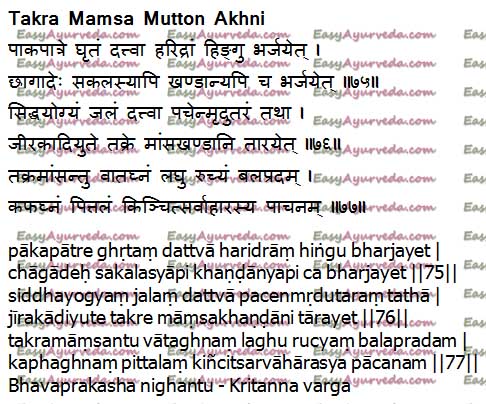Mutton Akhni – Qualities, Health Benefits, Ayurvedic Method
By Dr MS Krishnamurthy MD(Ayu), PhD.
Cooking meat with any sour liquids is very common. Vinegar, lemon juice, cocum juice, tamarind juice etc are used for this purpose. This serves both the purpose of cooking of flesh:
(i) It makes the flesh soft and easy for digestion
(ii) It eases the process of digestion due to its digestive and carminative effect.
But meat cooking with buttermilk even though looks strange, was practiced during ancient times itself. Good rationality can also built up in this regard. The classical literatures explain the product obtained by cooking with buttermilk as mutton akhni or Takra mamsa.
The explanation regarding akhni is found in Bhavaprakasha nighantu and same is summarized here below –

Reference: Bhavaprakasha nighantu – Kritanna varga – 87 – 89.
Table of Contents
Mutton Akhni
What is Takra mamsa or mutton Akhni?
In a pan ghee is taken and warmed. To this turmeric and asafetida are added little and fried. Further the pieces of the meat of goat is added and fried. Later, by adding the water it is cooked well in mild intensity of heat, during which salt may is also added. There after well cooked meat is added to the buttermilk containing the cumine seeds and boiled a little.
This is served along with rice or food. This preparation is called Meat akhni as per Ayurveda. It is also called Akhni Pulao, Akhni Pilao etc.
Qualities
Light for digestion(laghu),
Vatakaphahara – Balances Vata and Kapha Dosha.
Pittavardhaka – can increase Pitta Dosha
Balya – improves strength and immunity
kinchit ushna (slightly warm).
Action
Ruchya (appetizer),
veerya evam shaktivardhaka (tonic and energizer),
supachaka (digestive),
anti flatulent, carminative (vata anulomaka).
Application
As buttermilk is Kaphavatahara, this nature is contributed significantly in this product. Mutton Akhni, is a good appetizer and energizer. Hence it can be recommended in emaciating disorders, especially those who are suffering from tuberculosis, muscular dystrophy, leanness of the body, chronic neuro – muscular diseases etc. Even though this is mild aggravating of pitta dosha it is a good digestive and carminative. Hence intake of akhni in smaller amount will not cause much discomfort.
A rare kind of non vegetarian recipe akhni has every potential to take its own position in non – veg Menu card of the hotels. Also it is the genuine and true way to introduce age old classical and traditional non – veg recipe to the public who are seeking for it.
Click to consult Dr MS Krishnamurthy MD (Ayu), PhD









One comment
Dr. Kishori Khirwadkar
Please note:
Any meat coocked with acid( vinegar, tamarind, lemon juice or cokum juce) will not be soft. In fact one should put these things (if one likes the taste) only after the meat is cooked. The meat softners are all peptide digesting enzymes like those containing in ginger, raw papaya, ananas, kiwi etc.